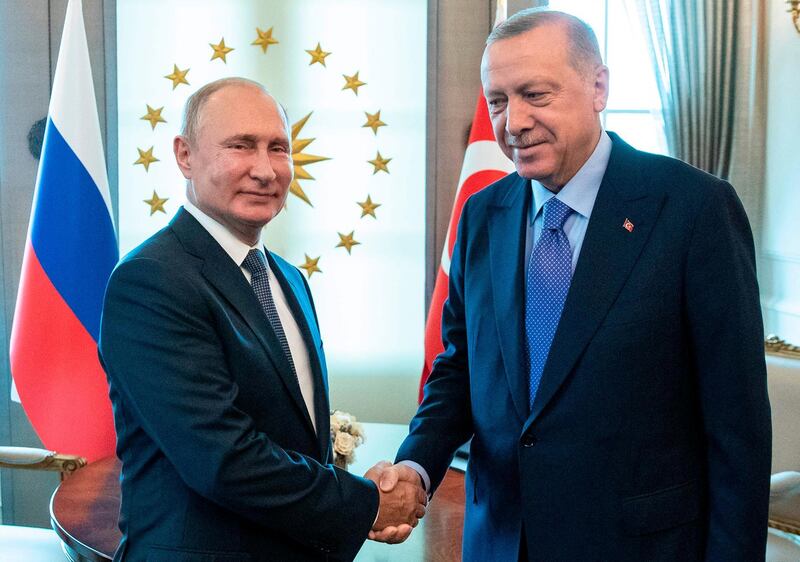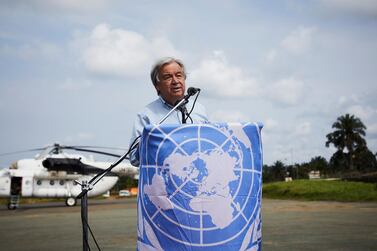The leaders of Turkey, Russia and Iran met in Ankara on Monday to discuss the eight-year war in Syria, focusing on the situation inside the country’s final rebel bastion and finding a lasting solution to the conflict.
The meeting – the fifth of its kind since the trio initiated the Astana peace process nearly three years ago – concentrated on Idlib, the north-west province bordering Turkey where fighters are holding out against President Bashar Al Assad’s forces.
Hosted by President Recep Tayyip Erdogan at Cankaya Mansion overlooking the Turkish capital, the summit saw the three leaders hold a series of one-on-one meetings before gathering for a three-way forum.
"We will address first and foremost the situation on the field in Idlib, the developments east of the Euphrates, the stage reached in the political process and the issue of Syrian refugees," Mr Erdogan told a press conference before their trilateral summit.
He said the meeting would “bring new breath to the Astana process” and that all three were in “full agreement” on Syria.
“We are with the Syrian people in their troubled days,” he added.
The Astana process aims to provide a political solution to the conflict, paving the way for elections under a new constitution.
Russia’s Vladimir Putin and Iranian President Hassan Rouhani back Al Assad and have been the deciding factor in his forces retaking most of Syria’s territory from rebel factions, some of which are supported by Turkey, and extremist groups.
Mr Rouhani said the trio “want to see Syria united, we want territorial integrity and national sovereignty respected so the people will enjoy their civic rights in full”.
The future of Idlib has emerged as a crucial issue in the final stages of the Syria conflict.
The Turkish delegation led by Mr Erdogan went into the summit hoping to establish a safe zone in Idlib for civilians; discuss the formation of a committee to draft a new Syrian constitution; and inform Russia and Iran about another safe zone in north-east Syria being set up with the US.
In April, Al Assad’s forces, backed by the Russian military, launched an offensive in Idlib seeking to oust rebels, who included Turkish-backed groups as well as extreme elements such as Al Qaeda-linked Hayat Tahrir Al Sham.
The regime aims to retake control of two highways linking the northern city of Aleppo to Hama and Latakia.
Caught up in the violence are around three million civilians. The United Nations estimates that at least 500 civilians have been killed since April.
Tens of thousands are now gathered near the Turkish border as they try to escape fighting to the south.
Turkey, which already hosts 3.6 million Syrians, fears further fighting could create a fresh wave of refugees as well as an influx of extremist fighters.
Ankara is also concerned about the threat to its troops based at 12 observation posts set up around Idlib. Last month a convoy heading for one outpost, which had become surrounded by Syrian government forces, was hit by an air strike.
In recent days, a ceasefire agreed at the end of August partly broke down with artillery attacks on villages in southern Idlib and reports of air strikes in the western part.
On Friday, Mr Erdogan said attacks on Turkish soldiers would lead to retaliation, raising the threat of direct conflict between Turkey and Syria. He added that the summit would try to halt migration to Turkey, initiate a ceasefire and tackle “terrorist” groups.
Russia and Turkey have strengthened their defence and energy ties in recent years. Mr Erdogan and Mr Putin have met seven times so far this year and Ankara has purchased air defence missiles from Russia, antagonising the US.
The three leaders also discussed plans by Turkey and the US to set up a corridor along its border with north-east Syria, where the Kurdish-dominated Syrian Democratic Forces (SDF) control territory between the Euphrates river and the Iraq border.
The SDF leadership’s ties to the Kurdistan Workers’ Party (PKK), which has waged a 35-year insurgency against Ankara, means it is viewed as a terrorist group by Turkey. The SDF, however, has the backing of the US after leading the ground war against ISIS.
Turkey hopes to return Syrian refugees to the area, which it wants to extend 30 kilometres into Syrian territory.






